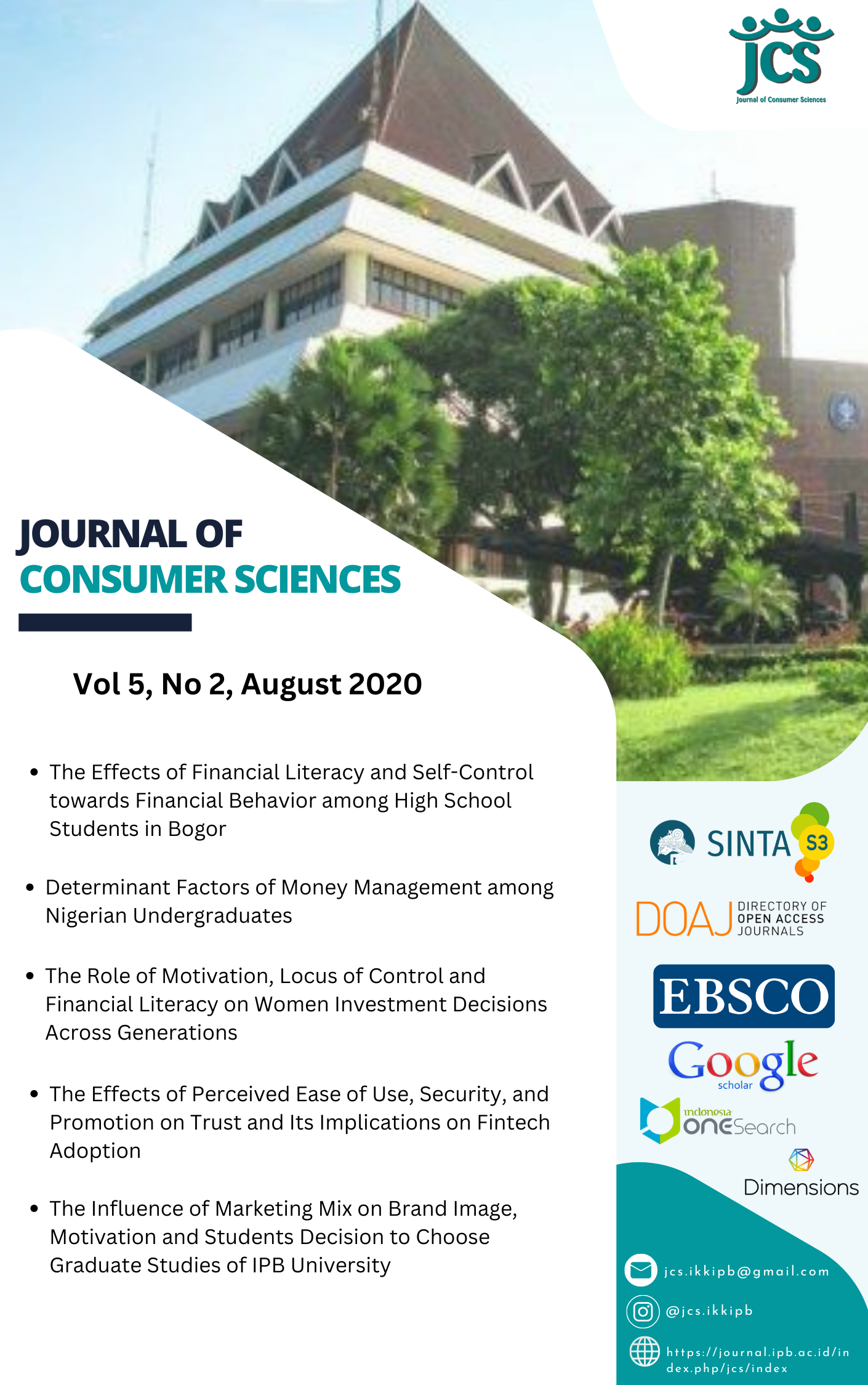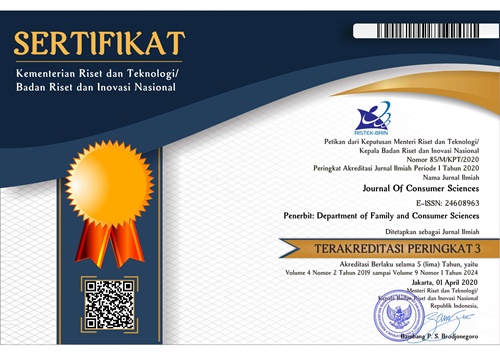Determinant Factors of Money Management among Nigerian Undergraduates
Abstract
The study assessed money management on Nigerian undergraduates at the University of Ilorin, Nigeria. Six research questions and four hypotheses were formulated. Descriptive research of a survey type was adopted. There were 16 faculties with five were selected purposively. The snowball method was used to select the sample size from the total population. A self-structured questionnaire was used to elicit information from the participants. Data collected were analyzed using frequency and percentage, while hypotheses were tested using ANOVA at 0.05 level of significance. Based on the findings, the participants agreed that they had different sources of money to make use of with a grand mean score of 2.83, while the course of study, religious beliefs, relationship status, and lifestyle influenced their money management with grand mean scores 2.80, 2.56, 2.85 and 2.70 respectively. The research hypotheses depicted the insignificant effect on religious beliefs, lifestyle, and relationship status had on money management, but only the effect of undergraduates' course of study was significant, and thus, the hypothesis was rejected. Conclusively, every undergraduate should apply a good pattern of financial behavior for improvement and sensitize themselves on money appropriateness since they will become future managers and decision-makers that will generate future revenues.
References
Brigham, E., & Houston, J. (2014). Essentials of financial management (Third Edition) Singapore: Cengage Learning.
Daft, R., Benson, A., & Henry, B. (2016). Management (2nd Editio). USA: Cengage Learning. Retrieved from https://www.alibris.com/Management-Richard-L-Daft/book/4141059
Du, X., Du, Y., Zeng, Q., Pei, H., & Chang, Y. (2016). Religious atmosphere, law enforcement, and corporate social responsibility: Evidence from China. Asia Pacific Journal of Management, 33, 229-265. https://doi.org/10.1007/s10490-015-9441-0
Eckwert, B., & Zilcha, I. (2015). Higher Education Financing. In The Economics of Screening and Risk Sharing in Higher Education. https://doi.org/10.1016/b978-0-12-803190-2.00005-4
Gordon, L. (2010). Financial Anxieties Burden More Freshmen, Study Finds, p. 5. Retrieved from https://www.pressreader.com/usa/los-angeles-times/20100121/281578056793718
Graves, E., & Savage, S. (2015). Financial Pasts, Presents, and Futures of Community College Students of a Personal Finance Course. Journal of Business and Finance Librarianship, 20(1), 116-132. https://doi.org/10.1080/08963568.2015.977132
Heenkenda, S. (2014). Inequalities in the Financial Inclusion in Sri Lanka: An Assessment of the Functional Financial Literacy. MPRA Paper, (67293). Retrieved from https://www.researchgate.net/publication/281409218_Inequalities_in_the_Financial_Inclusion_in_Sri_Lanka_An_Assessment_of_the_Functional_Financial_Literacy
Hisyam, M., & Rafi, I. M. (2016). A Study on Financial Management among Students. Research Hub, 2(1), 75–79. ISSN: 2180-0065.
Hodson, R., & Dwyer, R. E. (2014). Financial Behavior, Debt, and Early Life Transitions: Insights from the National Longitudinal Survey of Youth, 1997 Cohort. Ohio.
Javine, V. (2013). Financial knowledge and student loan usage in college students. Financial Services Review.
Jorgensen, B. L., & Savla, J. (2010). Financial literacy of young adults: The importance of parental socialization. Family Relations, 59(4), 465–478. https://doi.org/10.1111/j.1741-3729.2010.00616.x
Kabir, S, M, S. (2013). Positive attitude can change life. Journal of Chittagong, University Teachers Association, 7(1), 55–58.
Kabir, S, M, S. (2016). Measurement Concept: Variables, Reliability, Validity and Norm. In Basic Guidelines for Research: An Introduction Approach for all Disciplines (First, pp. 72–110). Bangladesh: Chittagong-4203.
Khamis, n. A., Janor, H., & Yakob, R. (2015). Tahap Literasi Kewangan dalam Kalangan Pelajar Universiti Awam: Kajian di Universiti Kebangsaan Malaysia. Jurnal Personalia Pelajar.
Kowel, C. A. (2015). The Influence of Personality, Lifestyle, Money Attitude on Customer Purchase Decision (Case Study: Manado Grand Palace Convention Hall). Jurnal Berkala Ilmiah Efisiensi, 15(5), 417–425. Retrieved from https://ejournal.unsrat.ac.id/index.php/jbie/article/view/9850
Ksendzova, M., Donnelly, G. E., & Howell, R. T. (2017). A Brief Money Management Scale and Its Associations With Personality, Financial Health, and Hypothetical Debt Repayment. Journal of Financial Counseling and Planning, 28(1), 62–75. https://doi.org/10.1891/1052-3073.28.1.62
Liyanage, P. T. D., Kumara, U. A., & Withanawasam, M. K. P. (2017). Employability Survey of the Management Graduates in Sri Lanka. Retrieved from http://dr.lib.sjp.ac.lk/handle/123456789/5514
Lusardi, A., & Mitchell, O. S. (2014). The economic importance of financial literacy: Theory and evidence. Journal of Economic Literature, 5(1), 5-44. https://doi.org/10.1257/jel.52.1.5
Mahdzan, N. S., & Tabiani, S. (2013). The impact of financial literacy on individual saving: An exploratory study in the Malaysian context. Transformations in Business and Economics, 12(1), 41-55.
Manikandan, S. (2011). Frequency Distribution. Journal of Pharmacology and Pharmacotherapeutics, 2(1), 54–55.
McNair, S., Summers, B., de Bruin, W. B., & Ranyard, R. (2016). Individual-level factors predicting consumer financial behavior at a time of high pressure. Personality and Individual Differences, 9, 211-216. https://doi.org/10.1016/j.paid.2016.05.034
Mottola, G. R. (2014). The Financial Capability of Young Adults — A Generational View. FINRA Foundation Financial Capability Insights.
Nurhayati, L., & Muflikhati, I. (2020). Child involvement in family financial management and subjective wellbeing of children from the intact and non-intact families. Journal of Consumer Sciences, 5(1), 46-57. https://doi.org/10.29244/JCS.5.1.46-57
Pham, T. H., Yap, K., & Dowling, N. A. (2012). The impact of financial management practices and financial attitudes on the relationship between materialism and compulsive buying. Journal of Economic Psychology. https://doi.org/10.1016/j.joep.2011.12.007
Rea, J. K., Zuiker, V. S., & Mendenhall, T. J. (2016). Money and Emerging Adults: A Glimpse into the Lives of College Couples' Financial Management Practices. Journal of Financial Therapy. https://doi.org/10.4148/1944-9771.1110
Ridhayani, F., & Johan, I. R. (2020). The Influence of Financial Literacy and Reference Group toward Consumptive Behavior Across Senior High School Students. Journal of Consumer Sciences, 05(01), 29–45. https://doi.org/10.29244/JCS.5.1.29-45
Sachitra, V., & Bandara, U. (2017). Measuring the academic self-efficacy of undergraduates: The role of gender and academic year experience. International Journal of Educational and Pedagogical Sciences.
Sachitra, V., Wijesinghe, D., & Gunasena, W. (2019). Exploring undergraduates' money-management life: insight from an emerging economy. Young Consumers, 20(3), 167-189. https://doi.org/10.1108/YC-07-2018-00828
Su, W., & Deng, M. (2012). Survey and Thought of Financial Management and Education in High School Students in Nanjing. Creative Education, 3, 228-231. https://doi.org/10.4236/ce.2012.32036
Sundaram, K., Dwivedi, S., & Sreenivas, V. (2010). Medical Statistics Principles and Methods (First Edit). New Delhi: B.I Publications Pvt Ltd.
Authors who publish with this journal agree to the following terms:
- Authors retain copyright and grant the journal right of first publication with the work simultaneously licensed under a

This work is licensed under a Creative Commons Attribution 4.0 International License. that allows others to share the work with an acknowledgement of the work's authorship and initial publication in this journal. - Authors are able to enter into separate, additional contractual arrangements for the non-exclusive distribution of the journal's published version of the work (e.g., post it to an institutional repository or publish it in a book), with an acknowledgement of its initial publication in this journal.
- Authors are permitted and encouraged to post their work online (e.g., in institutional repositories or on their website) prior to and during the submission process, as it can lead to productive exchanges, as well as earlier and greater citation of published work (See The Effect of Open Access).











